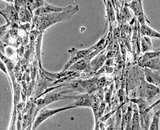Cardiac Fibroblasts (CF)
Cardinal fibroblasts; Cardiac Fibroblast Cells

Cardiac fibroblasts (CF) are the most prevalent cell type in the heart and play a key role in regulating normal myocardial function and in the adverse myocardial remodeling that occurs with hypertension, myocardial infarction and heart failure. Many of the functional effects of cardiac fibroblasts are mediated through differentiation to a myofibroblast phenotype that expresses contractile proteins and exhibits increased migratory, proliferative and secretory properties. Cardiac myofibroblasts respond to proinflammatory cytokines (e.g. TNFα, IL-1, IL-6, TGF-β), vasoactive peptides (e.g. angiotensin II, endothelin-1, natriuretic peptides) and hormones (e.g. noradrenaline), the levels of which are increased in the remodeling heart.
Organism species: Homo sapiens (Human)
- Cell CSI095Hu01 Primary Human Cardiac Fibroblasts (CF) In Stock
- Customized Service n/a Extract of Cardiac Fibroblasts (CF) Total Protein/DNA/RNA Extract Customized Service Offer
- Customized Service n/a Medium for Cardiac Fibroblasts (CF) (If Necessary) Cell Culture Medium Customized Service Offer
Organism species: Mus musculus (Mouse)
- Cell CSI095Mu01 Primary Mouse Cardiac Fibroblasts (CF) In Stock
- Extract ESI095Mu11 Extraction of Total DNA from Mouse Cardiac Fibroblasts (CF) In Stock
- Medium MSI095Mu11 Medium for Mouse Cardiac Fibroblasts (CF) In Stock
Organism species: Rattus norvegicus (Rat)
- Cell CSI095Ra01 Primary Rat Cardiac Fibroblasts (CF) In Stock
- Extract ESI095Ra02 Extraction of Total Protein from Rat Cardiac Fibroblasts (CF) In Stock
- Extract ESI095Ra11 Extraction of Total DNA from Rat Cardiac Fibroblasts (CF) In Stock
- Medium MSI095Ra11 Medium for Rat Cardiac Fibroblasts (CF) In Stock
Organism species: Oryctolagus cuniculus (Rabbit)
- Cell CSI095Rb01 Primary Rabbit Cardiac Fibroblasts (CF) In Stock
- Customized Service n/a Extract of Cardiac Fibroblasts (CF) Total Protein/DNA/RNA Extract Customized Service Offer
- Medium MSI095Rb11 Medium for Rabbit Cardiac Fibroblasts (CF) In Stock
Organism species: Canis familiaris; Canine (Dog)
- Cell CSI095Ca01 Primary Canine Cardiac Fibroblasts (CF) In Stock
- Customized Service n/a Extract of Cardiac Fibroblasts (CF) Total Protein/DNA/RNA Extract Customized Service Offer
- Medium MSI095Ca11 Medium for Canine Cardiac Fibroblasts (CF) In Stock
Organism species: Sus scrofa; Porcine (Pig)
- Cell CSI095Po01 Primary Porcine Cardiac Fibroblasts (CF) In Stock
- Customized Service n/a Extract of Cardiac Fibroblasts (CF) Total Protein/DNA/RNA Extract Customized Service Offer
- Medium MSI095Po11 Medium for Porcine Cardiac Fibroblasts (CF) In Stock
Organism species: Bos taurus; Bovine (Cattle)
- Customized Service n/a Cardiac Fibroblasts (CF) Primary Cells Customized Service Offer
- Customized Service n/a Extract of Cardiac Fibroblasts (CF) Total Protein/DNA/RNA Extract Customized Service Offer
- Customized Service n/a Medium for Cardiac Fibroblasts (CF) (If Necessary) Cell Culture Medium Customized Service Offer


